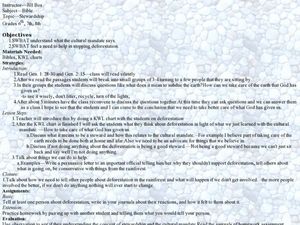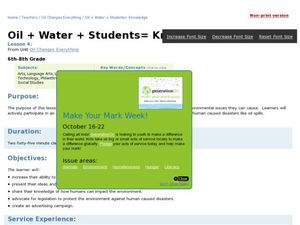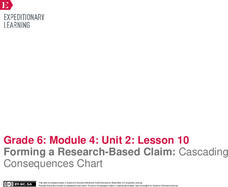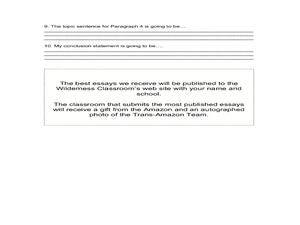Curated OER
Anti-social Behavior - A Topical Lesson From Learn.co.uk
Students discuss issues of crime, punishment, respect and responsibility,
and explore arguments about causes of crime and possible solutions, and write persuasive essays sharing their views.
Curated OER
If I Had A Million Dollars
Students write a persuasive letter. In this philanthropy lesson, students write about what they would do if they had a million dollars. They discuss worthwhile community causes they could donate money to. Students also research...
Education World
Human Nature- Good or Evil?
Students explore the philosophical nature of good vs. evil. In this literacy/philosophy instructional activity, students read and discuss media articles that illustrate human nature as inherently "good" or "evil." Students practice...
Curated OER
Stewardship
Students explore deforestation and cultural mandate. For this stewardship lesson, students complete a KWL chart about deforestation and discuss how stewardship relates to the cultural mandate after reading silently in Genesis. Students...
Curated OER
Screening the Silver Screen
Learners write New York Times Movie Guide Reviews using descriptive and persuasive language.
Curated OER
Writing: Advertisements
Pupils explore these web pages to explore how to write good advertisements.
Curated OER
Oil + Water + Students= Knowledge
Middle schoolers create advertising with the intent of protecting wildlife. In this service learning lesson plan, students craft advertisements and write persuasive essays regarding the protection of wildlife.
Curated OER
What's in a Name? The Use of Native American Images in Sports
Students discuss and analyze the pros and cons of using Native American names and images to represent sports teams. Using primary sources, including position statements from Native American tribes, interviews with school alumni and...
Curated OER
Sneetches by Dr. Seuss
Students read "Sneetches" by Dr. Seuss. They complete a story map and write about the topic of prejudice. They role-play star-bellied and plain-bellied sneetches and write a persuasive essay about their experiences.
Curated OER
The Breakfast Busters Persuade Others
Students write persuasive essays about their favorite breakfast cereal after seeing how advertisements are used to influence people.
Curated OER
Retain or Abandon, Adapt or Convert? The Immigrant's Dilemma
Middle schoolers read and discuss a narrative exploring how immigrants retain their own cultures or assimilate into the host country. They examine the emigrant's experience in Liberia and write a position paper.
Curated OER
Theatre: Persuasive Explorers
Learners act like a famous explorer. In this explorer lesson, students research an explorer and act out persuasive arguments in which that explorer might be involved.
Curated OER
Persuasive Text: Vocabulary Charades
Students play charades to act out vocabulary words that have recently been introduced in class. In this vocabulary lesson students may work in groups or in pairs.
Curated OER
Propaganda and Its Effects on WWI
Students learn about propaganda. In this WWI instructional activity, students define the term propaganda. Working in groups, they are given a packet of postcards and posters used during WWI. They answer questions about their uses and...
Curated OER
Description and Modifying: What's On Your Plate?
Young scholars create a food product and an advertisement promoting it. In this description and advertising lesson, students read children's book for inspiration and discover advertising techniques. Young scholars complete their ads...
EngageNY
Forming a Research-Based Claim: Cascading Consequences Chart
Is it relevant? Scholars choose a resource from their folders and search for relevant information about the harmful and beneficial consequences of DDT. They mark benefits in one color and harmful effects with another color. They then add...
Bright Hub Education
Advertisement Analysis
Middle schoolers review magazine ads and take a look at some of the most common advertising techniques. From analyzing these ads, youngsters begin to become aware of how advertisers target specific age groups, gender groups, and how they...
Curated OER
Main Idea in Informational Text
Individuals complete a pre-assessment to gauge their ability to determine the main idea and supporting details in nonfiction text. They examine a new piece of nonfiction reading by looking at the table of contents, headings, and index...
Curated OER
The Statue of Liberty: Bringing the 'New Colossus' to America
Learners discuss meaning of symbols associated with Statue of Liberty, read and analyze Emma Lazarus' sonnet, "The New Colossus," and write persuasive letter to a nineteenth-century audience to gain support for bringing statue to America.
Curated OER
Global Warming and Climate Change
Students explore the environment by writing a persuasive letter. In this global warming instructional activity, students identify the key problems with our energy consumption in the United States. Students complete worksheets and write a...
Curated OER
Stocking up for the Next Millennium
Learners examine how democracy stands the test of time. In this technology lesson, students research inventions and contributions of the 20th century in order to gather information to write a persuasive essay on the topic.
Curated OER
Social Studies - Guessing Game
Focus on a particular geographic location with this resource. Learners use their social studies textbook to look up information about a specific place. They write down a list of facts and read them to the class. Classmates guess which...
Curated OER
Publish Your Daily Dilemma Results
Young scholars fill out an outline and write an expository text on a dilemma that they read about. They brainstorm how they can solve the dilemma, write about it, then submit their suggestions to the Wilderness Classroom Expedition Team.
Curated OER
Change of Perspective
After reading an example of a Cultural Connection about a particular person, class members are asked to think about what this person might experience on a daily basis. They then craft a narrative from the subject’s point of view.

























